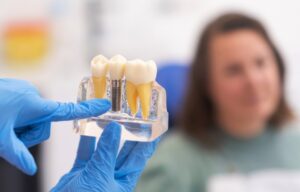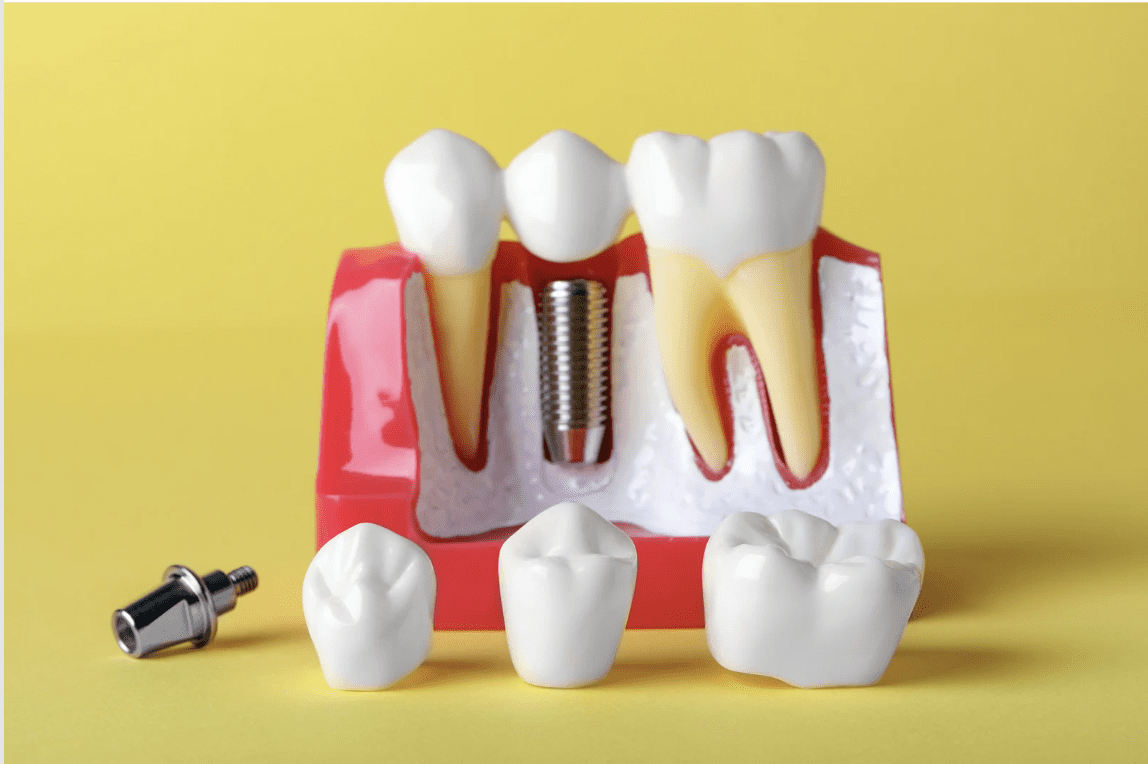Losing a tooth can be tough, affecting your self-confidence and possibly leading to more dental problems. Thankfully, modern dentistry offers reliable solutions like dental implants and crowns to restore your smile. As an experienced dental professional, I’m here to explain the key differences between these two treatments, helping you make the best choice for your needs.
Understanding Dental Implants

Dental implants are a complete solution for missing teeth. They consist of a titanium post surgically placed into your jawbone to replace the tooth’s root, and a custom-made crown that sits on top, looking and functioning like a natural tooth. This approach restores your smile’s appearance and provides strong, long-lasting stability.
The Dental Implant Procedure
The dental implant process involves several stages:
1. Implant Placement
The first step is placing a titanium post into your jawbone. This is a minor surgical procedure typically performed under local anaesthesia. The dentist makes a small incision in your gum to access the jawbone, where a hole is drilled to insert the implant. The titanium post serves as an artificial root, providing a stable foundation for the future crown.
2. Healing Period
After the implant is placed, the healing process, known as osseointegration, begins. This period can last from a few weeks to several months, allowing the bone to grow and fuse with the implant. This integration is crucial for the stability and success of the implant, ensuring it functions like a natural tooth root.
3. Abutment Attachment
Once the implant has fully integrated with the jawbone, an abutment is attached. This involves a minor surgical procedure where the gum is reopened to expose the implant. The abutment is a small connector piece that links the implant to the crown, protruding slightly above the gum line.
4. Crown Placement
The final stage involves placing the custom-made crown onto the abutment. The dentist takes impressions of your teeth to create a crown that matches the size, shape, and colour of your natural teeth. Once the crown is ready, it is securely attached to the abutment, completing the restoration and providing a functional, aesthetically pleasing tooth.
Advantages and Considerations of Dental Implants
Advantages:
- Longevity: Dental implants are designed to last a lifetime with proper care, making them a long-term investment in your oral health.
- Natural Appearance: Implants are custom-made to match your natural teeth, providing a seamless and natural look.
- Bone Preservation: Implants help preserve jawbone density by stimulating bone growth, preventing the bone loss that typically occurs with missing teeth.
- Stability: Unlike dentures, implants are firmly anchored in the jawbone, offering superior stability and functionality.
- Oral Health: Implants do not require altering adjacent teeth, preserving the integrity of your natural teeth.
Considerations:
- Cost: Dental implants can be more expensive than other tooth replacement options, ranging from $4,000 to $9,000 per tooth.
- Invasiveness: The procedure is more invasive, involving surgery and a longer recovery period.
- Suitability: Certain medical conditions, such as uncontrolled diabetes or severe bone loss, may affect your suitability for implants. A thorough evaluation by your dentist is necessary to determine if implants are right for you.
Understanding Dental Crowns

Dental crowns are caps placed over damaged or weakened teeth to restore their shape, size, and appearance. They are commonly used to protect and strengthen teeth, as well as improve your smile.
Most dental crowns are made of porcelain or ceramic. These crowns are designed to mimic the natural appearance of teeth, making them an excellent choice for front teeth. They are biocompatible and metal-free, reducing the risk of allergic reactions or irritation.
The Crown Placement Process
Placing a dental crown usually involves two appointments:
1. Preparation
During the first visit, the dentist prepares the tooth by removing a small amount of enamel to make room for the crown. This step ensures the crown fits properly and aligns with your bite. An impression of the prepared tooth is then taken, either using a digital scanner or a traditional mould. This impression is sent to a dental lab, where your custom crown is fabricated. In the meantime, a temporary crown may be placed to protect the tooth.
2. Placement
On the second visit, the dentist removes the temporary crown and checks the fit and colour of the permanent crown. Adjustments are made as necessary to ensure a comfortable bite and a natural look.
Once satisfied with the fit, the dentist will clean and dry the tooth, then use a special dental cement to secure the crown in place. The excess cement is removed, and the dentist will check your bite to ensure the crown feels comfortable.
Advantages and Considerations of Dental Crowns
Advantages:
- Protection: Crowns protect and strengthen damaged teeth, preventing further decay or damage.
- Aesthetics: They improve the appearance of teeth, restoring their shape, size, and colour. Porcelain and ceramic crowns, in particular, offer a natural look.
- Functionality: Crowns restore the functionality of teeth, allowing you to chew and speak normally.
- Versatility: They can be used for various dental issues, including cracked teeth, large fillings, root canals, and cosmetic improvements.
Considerations:
- Durability: While crowns are durable, they can chip, crack, or break, especially if subjected to excessive force. Porcelain crowns are more prone to chipping compared to metal or zirconia crowns.
- Sensitivity: Some patients may experience temporary sensitivity to hot and cold after the crown is placed. This usually subsides after a few days but can be managed with desensitising toothpaste if it persists.
- Cost: Crowns can be expensive, with prices up to $2,500 per tooth. The cost varies depending on the material used and the complexity of the case.
- Enamel Removal: The process involves removing some enamel, which is irreversible. This is necessary for the crown to fit properly.
Comparing Dental Implants and Crowns
When deciding between dental implants and crowns, consider these factors:
- Replacement vs. Restoration: Implants replace missing teeth, including the root, while crowns restore damaged teeth.
- Longevity: Implants are more durable and can last a lifetime, whereas crowns may need replacing every 10-15 years.
- Cost: Implants are generally more expensive than crowns.
- Suitability for Front Teeth: Implants offer a more natural look and stability for front teeth. Crowns can also restore front teeth but may not be as stable.
- Broken or Missing Teeth: Implants are better for severely damaged or missing teeth. Crowns are suitable for teeth with minor damage.
Choosing the Right Solution for You

The choice between a dental implant and a crown depends on your specific needs, oral health, and personal preferences. Consult with a qualified dentist who can examine your mouth, discuss your options, and help you make the best decision.
Frequently Asked Questions
How long can I wait to get a crown after implant surgery? The timeline varies. Sometimes a temporary crown is placed immediately, but it often takes several months for the implant to integrate before the permanent crown is attached.
How is a crown attached to a dental implant? A crown is attached to the implant using an abutment, a small connector piece. The crown is securely cemented or screwed onto the abutment.
When is a dental implant the better choice over a crown? Implants are better for missing or severely damaged teeth. Crowns are better for repairing minor damage or decay.
How do I know if I’m a good candidate for a dental implant or a crown? A consultation with a qualified dentist, including an oral examination and X-rays, will determine the best option for you.
Get Started on Your Journey to a Healthy Smile
Restoring a missing or damaged tooth can greatly improve your oral health and confidence. Understanding the differences between dental implants and crowns helps you make the best decision for your needs.
The team at Melbourne Dental Implant and Sleep Centre is here to support you so you can restore your smile and confidence. Call us at 1800 IMPLANT to schedule a consultation with one of our experts.

